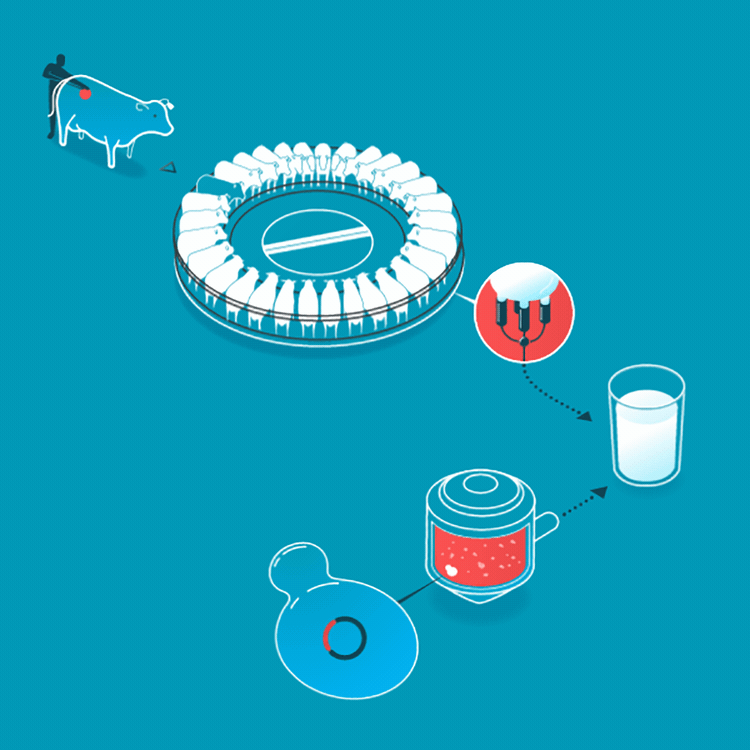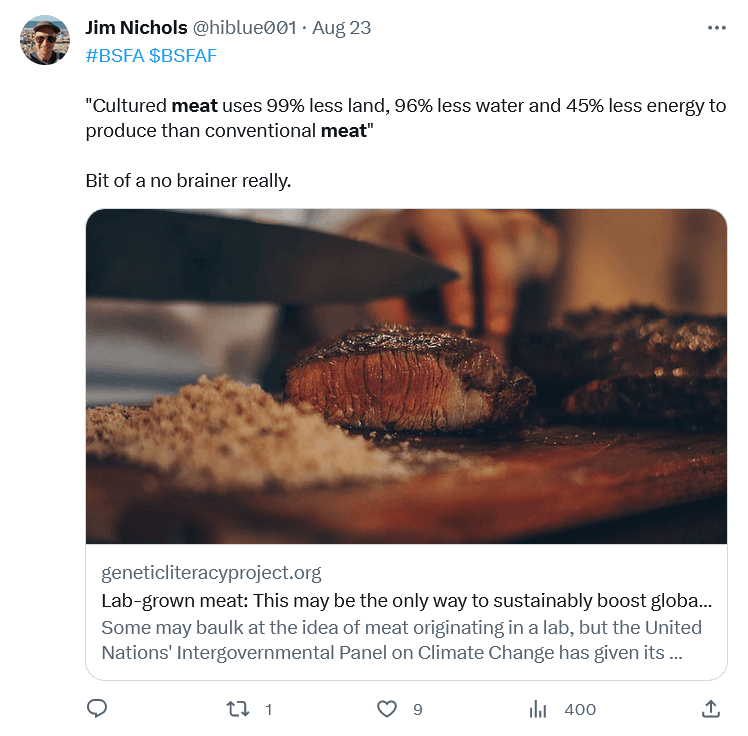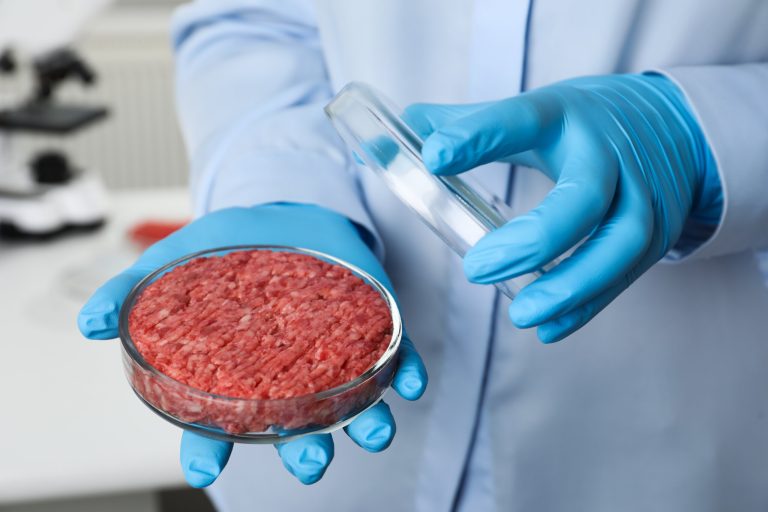• Food technology can address our sustainability issues.
• Laboratory-grown meat and dairy can be effectively identical to animal versions.
• Food technology can also help tackle food fraud.
Food technology may not be in the spotlight right now, but it could be the solution to the world's food sustainability problems.
Sustainability is not just about carbon emissions and electric vehicles. Global food demand is expected to increase by 70% by 2050 – a demand that cannot be met ethically or sustainably using current production methods.
One solution to this is cellular agriculture. The phrase “lab-grown” may not sound exactly appealing, but the method being actively explored today uses cells and innovative biotechnologies to produce agricultural products that are accessible, ethical, and sustainable.
Cellular agriculture is commonly used to make animal-derived foods and ingredients, such as meat, seafood, dairy products, fats, egg whites, and gelatin.
In some cases, with products such as milk, the animal can be removed from the equation using a microbe such as yeast or bacteria. In the example of milk made from yeast, the yeast is changed by inserting a gene that carries the blueprints for casein, a milk protein.

Milk is usually made by mother cows that are kept in a lactating state in an industrial environment. Alternatively, we can make exactly the same milk by fermenting it, using a culture that consumes simple sugars to make milk proteins. Source: New Harvest.
Since all cells read the same genetic code, the yeast, now carrying what is called recombinant DNA, makes casein identical to the casein that cows make in their milk.
Cell culture and fermentation are proven methods in the pharmaceutical and biotechnology sectors, and have the potential to be a game-changer in food production. In fact, animal insulin can be considered the first cellular agricultural product.
Once it was discovered to be an effective treatment, insulin was collected from the ground pancreas of pigs or cattle. Then, in 1978, Arthur Riggs, Keiichi Itakura, and Herbert Boyer were able to insert the gene carrying the DNA of human insulin into bacteria, so that the bacteria could make insulin identical to the insulin made by humans.
Today, the vast majority of insulin is made by these engineered yeast or bacteria. The resulting safety and consistency of insulin supply can be an indicator of the potential impact similar methods may have on food production.
This innovative approach to producing animal products – which goes beyond traditional farming methods – has the potential to overcome six critical challenges:
- Food insecurity
- Elimination of Forests
- Loss of biodiversity
- Climate change
- Public Health
- Animal kindness
The extent to which this impact will depend on the decisions made by biotech food companies as they move towards commercial scale.
Cell culture and fermentation processes require careful control and monitoring in order to achieve consistent, high-quality results. The bioreactor requires careful regulation of all important parameters such as nutrient concentration, pH, temperature, and oxygen content to optimally support the fermentation process and provide the highest possible product production.
The biochemical process is very sensitive to change, and if the process is disrupted, all the output becomes unusable.
For this reason, moving from laboratory to mass production can be expensive and complex. Construction costs are often high due to the complexity of the systems required for successful cell culture and fermentation.
With this in mind, financing from outside the sector may be necessary.
Food technology financing is at the forefront
Venture capital firm Supply Change Capital has invested $40 million in food technology. The company invests in the future of food, and recently closed its inaugural $40 million fund. Supply Change Capital is led by Noramai Cadena and Sheena Harris, two industry veterans who met at MIT Sloan Business School in 2009. The partners have made more than 100 investments to date.
The Latina-led company has invested more than $13 million in 15 early-stage food and agriculture technology companies since June 2021. The investments include deep-tech food, agriculture and ingredients companies, supply chain technology, and enterprise software. Latino, Black and/or female founders/CEOs make up 80% of the portfolio.

Noramai Cadena and Sheena Harris lead Supply Chain Capital.
“Supply Change Capital invests in technologies that support a more resilient food system. We invest through a climate and culture lens, which are big risks given the current existential crisis our planet and society face,” Harris said.
Also crucial to investing in the future of the food supply chain is fraud detection. Although it's easy to imagine the potential for food fraud in a future where food is bioengineered, it already represents a significant threat to consumers.
Technology against food fraud
Food fraud occurs when a food supplier intentionally deceives its customers about the quality and contents of the foods they are purchasing.
Therefore, Bia Analytical Ltd in Northern Ireland has signed an agreement with trinamiX GmbH to develop a new technology for detecting food fraud in the agri-food chain.
Detecting food fraud is difficult, and it's even harder for consumers to do it alone. Food fraudsters are creative in the ways they avoid detection.
Given the high demand for high-quality food and increasingly globalized food supply chains, the risk of food fraud is estimated to be high in the Asia-Pacific region. Although food technology may seem more risky in terms of fraud, cellular agriculture can mitigate the supply and demand issues that enable current types of food fraud.

A significant reduction in the impact on farmland could tip the balance in favor of lab-grown meat.
As a leading food authentication testing laboratory in the UK, Bia Analytical aims to take testing outside the laboratory and provide customers with a fast and portable authenticity result. The company uses chemical modeling and artificial intelligence applications to help reduce food companies' exposure to food fraud.
German company trinamiX GmbH, which works closely with partners to provide real-time material analysis to enhance decision-making across various industries, has partnered with Bia Analytics to offer a solution.
Dr Terry McGrath, Chief Technical Officer, added: “I am very excited about this partnership, I have worked in the food authenticity field for many years and see this as a huge step forward in our ongoing fight against food fraud.”
This method of verifying the legality of your food will certainly become more and more useful in the face of cellular agriculture. Do you prefer lab-grown cockroaches or your own?

